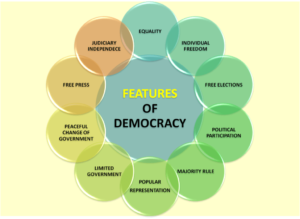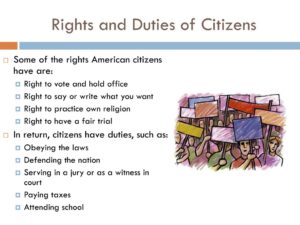Back to: Religion and National Value JSS 3
Welcome to class!
In today’s class, we’re going to be talking about Importance of educating citizens about their democratic rights and responsibilities. I trust you will enjoy the class!
Importance of Educating Citizens About their Democratic Rights and Responsibilities
In a democracy, citizens have both rights and responsibilities. Rights are the freedoms and protections guaranteed to us, while responsibilities are the duties we owe to our society and fellow citizens. Understanding these rights and responsibilities is crucial for actively participating in and upholding democracy in Nigeria.
Key Concepts:

- Democratic Rights: These are fundamental freedoms and entitlements that all citizens possess. In Nigeria, these rights are enshrined in the Constitution and include:
- Right to Life: Every person has the right to life and personal liberty.
- Freedom of Expression: The right to hold opinions, receive and impart ideas without interference.
- Freedom of Assembly and Association: The right to gather peacefully and form associations.
- Right to Vote and be Voted For: The right to participate in elections and choose leaders.
- Right to Education: The right to access quality education.
- Right to a Fair Trial: The right to be presumed innocent until proven guilty and to have a fair and impartial trial.
- Democratic Responsibilities: These are the duties that citizens are expected to fulfill to ensure the smooth functioning of democracy:

- Obeying the Law: Following the rules and regulations of the society.
- Paying Taxes: Contributing to the government’s revenue for public services.
- Voting in Elections: Participating in the electoral process to choose leaders.
- Holding Government Accountable: Demanding transparency and accountability from elected officials.
- Respecting the Rights of Others: Treating fellow citizens with dignity and respect.
- Being Informed and Engaged: Staying informed about current issues and participating in civic life.
Importance of Civic Education:
Civic education plays a vital role in teaching citizens about their rights and responsibilities. It equips them with the knowledge and skills needed to participate effectively in the democratic process.
- Empowering Citizens: Civic education empowers citizens to understand their rights, exercise them responsibly, and hold the government accountable.
- Promoting Active Participation: Informed citizens are more likely to vote, engage in public discourse, and contribute to their communities.
- Fostering Social Cohesion: Understanding our rights and responsibilities helps us to respect diversity and build a more inclusive society.
- Upholding the Rule of Law: When citizens know their rights and responsibilities, they are more likely to obey the law and demand justice.
Religious and National Values:
Many religions and traditional Nigerian values emphasize the importance of honesty, integrity, justice, and community participation. These values align with the principles of democracy and underscore the importance of understanding our rights and responsibilities.
Conclusion:
Educating citizens about their democratic rights and responsibilities is essential for building a strong, vibrant, and inclusive democracy in Nigeria. By understanding our rights and fulfilling our responsibilities, we can contribute to the development of a just and prosperous society.
We have come to the end of today’s class. I hope you enjoyed the class!
In the next class, we shall be discussing the techniques and practices for resolving disputes peacefully.
In case you require further assistance or have any questions, feel free to ask in the comment section below, and trust us to respond as soon as possible. Cheers!
